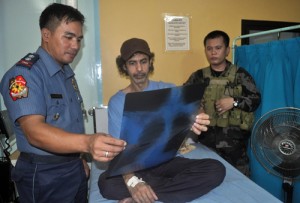A Jordanian TV reporter held captive by the Islamic militant group Abu Sayyaf in Sulu for 18 months was recovering in hospital Thursday after he was found wandering along a jungle road in Sulu province.
Looking gaunt and haggard, with his cheeks hollowed out, Baker Atyani was being treated for elevated blood pressure in Jolo, Sulu a day after he was discovered by police, provincial police spokesman C/Insp. Chris Gutierrez said.
Atyani is the Southeast Asia bureau chief of the Al-Arabiya News Network. The veteran journalist gained fame for interviewing Al-Qaeda leader Osama bin Laden months before the September 11, 2001 attacks.
“He had lost a lot of weight, from his weight of about 85 kilos before he was taken to 55 kilos,” Gutierrez said. “He is weak, but he can stand up and walk around without needing any assistance.”
Gutierrez said police saw Atyani wandering in a remote jungle-clad area in the village of Igasan, Patikul.
“After we confirmed his identity we took him to a hospital. He was apprehensive at first, but we introduced ourselves as police and (Atyani) lightened up when he realized he was safe,” Gutierrez said.
The Dubai-based broadcaster Al-Arabiya said in a statement Wednesday that Atyani was handed over to the authorities by the kidnappers, but the police account contradicted that.
The circumstances surrounding Atyani’s freedom remained murky, and Gutierrez could not say categorically whether he had escaped from his captors or was freed.
“We are keeping him here for the meantime while he is recovering and while he is being debriefed,” he said.
Previous kidnapping cases involving the Abu Sayyaf have involved large ransom payoffs, which local authorities euphemistically call payments for “board and lodging”.
Military and police sources had previously said the Abu Sayyaf had demanded millions in dollars in ransom, though neither Atyani’s family nor employer would confirm this.
Atyani hired two Filipino crew members, Rolando Letrero and Ramelito Vela, and went to Jolo in June last year to interview Abu Sayyaf leaders, but they were instead taken hostage.
The Filipinos were freed in February this year, and said no money had changed hands. They said they were separated from the Jordanian five days into their captivity.
Atyani’s release came after several calls by the Cairo-based al-Azhar, Jerusalem Grand Mufti and the Islamic scholars of Mindanao, the Organization of the Islamic Cooperation, Palestinian President Mahmoud Abbas, and after continuous follow up by the Middle East Broadcasting Center.
Last year, the military said it would arrest Atyani for espionage.
Col. Jose Johriel Cenabre, then deputy commander of naval forces in southern Philippines, said the journalist was “freely moving in the hinterlands with Abu Sayyaf terrorists and we are monitoring the situation.”
Cenabre was transferred to Manila after his statement came out in the press and later denied making such report.
Other reports identified Atyani as a conduit for the Abu Sayyaf and that the ransom demand was only a cover to hide the flow of funding to the terrorist group.
Provincial officials had warned Atyani against interviewing the Abu Sayyaf, but he and his crew went ahead and secretly met with terrorist leaders, among them Nadzmie Alih.
The three were reported missing after they did not return to their hostel in Jolo. They phoned local officials two days later to say that they were still filming the documentary.
AFP, Al Jacinto and Anthony Vargas


